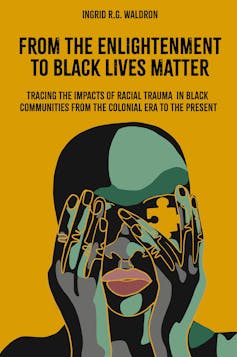The police officer on George Floyd in 2020 in the United States was a disgusting act in which a group of agents were involved who did not value much or no value to the life of a black man. In the painful nine minutes before he died under the knee of Derek Chauvin, Floyd shouted for air and his mother.
Those moments, recorded by a passerby and broadly and repeatedly divided into the days that followed, shocked the conscience of many Americans and others, which gave rise to protests in the United States and in other countries, many of which were led by the Black Lives Matter -Movement.
Chauvin was convicted of murder and three other agents were convicted of other serious crimes.
À lire aussi: how to deal with the pain of racism – and to become a better advocate: don’t call me resilient EP 2
Although there is now a greater consciousness and supervision of racism and violence in the police, there is also a long track record in the field of return to old habits. Deep-rooted racial prejudices are indeed rooted in the soul and psyche of North American society and worldwide.
When we think of Black Lives Matter, we usually think of criminal law, but the movement also started a conversation about the persistent mental health effects of police violence on those who experience it directly, but also on those who experience the substitute.
Black trauma
The traumatizing after effects of anti-black racism are also the result of the experiences of black people within other social structures, such as employment, education and health care.
The trauma that is the result of several forms of anti-black racism has a legacy that rooted root during the colonial era and that still continues, and that influences the spiritual, emotional, psychological and mental well-being of black people in Societies that have been damaged by colonialism, such as Canada. the US and the United Kingdom.

(Emerald Uitgeverij),, ” Author given (no reuse)
I am a professor and the Hope-Teerstoel Peace and Health in the Global Peace and Social Justice Program at McMaster University. I have been studying the black trauma for almost twenty years and recently published a book on this subject: From the lighting to Black Lives Matter: Mapping the consequences of racial trauma in black communities from the colonial era to the present.
The book documents that black bodies have been recipients since the colonial era for traumas that bear the weight of the past and the present. The black trauma is deep, complex and persistent, and has harmful consequences for the mental health of black people. It includes the dehumanized and persistent consequences of the slave trade, the social and economic submission of black people in Jim Crow America and the racist social structures that continue to exist there and in Canada, Great Britain and elsewhere.
For black people, trauma is the result of racist attacks on their spiritual, emotional, mental, psychological and physical well -being. When racism is present in the body in these deep -rooted ways, it manifests itself as emotional pain and anger, and the persistent after -effects continue to continue for generations.
Public health crisis
Tackling the public health crisis of racial trauma for black people requires racism to be recognized as a legitimate problem in health education, research, clinical practice, mental health care services and policy, and in the mental health care system in a broader sense.
It also requires that mental health care professionals not only become more culturally competent, but also develop structural competence skills.
This means that we must be willing to play a role in dismantling the inequalities embedded in our social structures, including tackling the impact of Upstream factors (poverty, poor public infrastructure, etc.) on the mental health of Black and other marginalized population groups.
Tackling racist trauma that black people experience also requires an analysis that appreciates the intergenerational and versatile characteristics of racism. This analysis would investigate how racism manifests itself not only over generations, but also at different levels, such as through everyday interactions between people (individual racism), within institutions (institutional racism), or by cultural dominance (cultural racism).
Challenging

(Shutterstock)
For too long, the efforts to tackle the differences between black and white and white people in the field of education, labor, employment, health care and other social structures focused on attributing these differences to pathologies that were believed to be inherent in the Black culture and black people. Instead, these efforts must be aimed at identifying, dismantling and resolving the pathologies embedded in these social structures and reducing power systems that influence mental health and well -being of black communities.
The solving of structural pathologies that harm black people must be accompanied by the willingness to understand, understand and appreciate the complexity of black life, black trauma and the black reactions on trauma that seem inappropriate for many, but those normal and Natural reactions are to the intergenerational, multi-generational reactions of racism. Facetted manifestations and manifestations at multiple levels.
Finally, solving the black trauma must be accompanied by challenging the colonial and imperial inheritances that are within psychiatry and other professions in mental health care.



